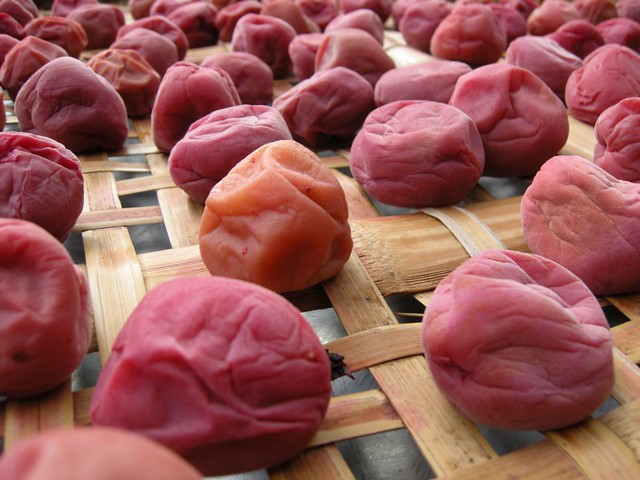 PREFACE
The Ume Project: Foraging
The Ume Project: Pickling for Umeboshi
The Ume Project: Umeshu (Plum Liqueur)
The Ume Project: The Aka-Shiso Edition
PREFACE
The Ume Project: Foraging
The Ume Project: Pickling for Umeboshi
The Ume Project: Umeshu (Plum Liqueur)
The Ume Project: The Aka-Shiso Edition
Since July, Yoko and I have been working on
umeboshi (pickled plums) with Sylvan of
Peko Peko, a Japanese catering company based in Oakland. From picking our own
ume from a backyard Berkeley tree, to hunting down enough
aka-shiso (red perilla leaves) to help add color to them during the pickling process, we did it all. And here are the fruits of our labor.
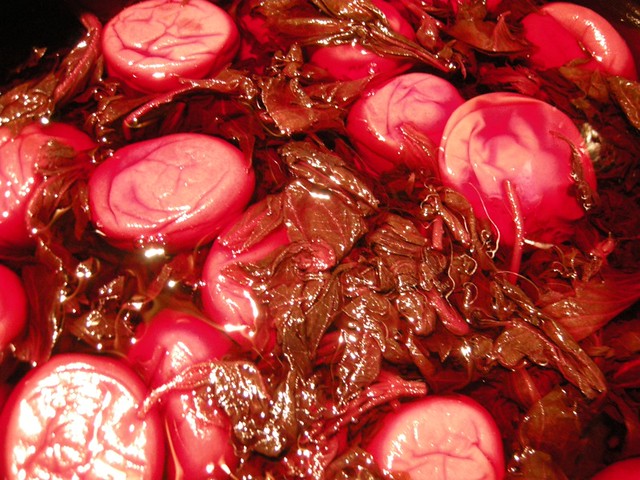 The plump ume marinating with the aka-shiso and ume-zu (pickling fluid-->ume vinegar)
The plump ume marinating with the aka-shiso and ume-zu (pickling fluid-->ume vinegar)
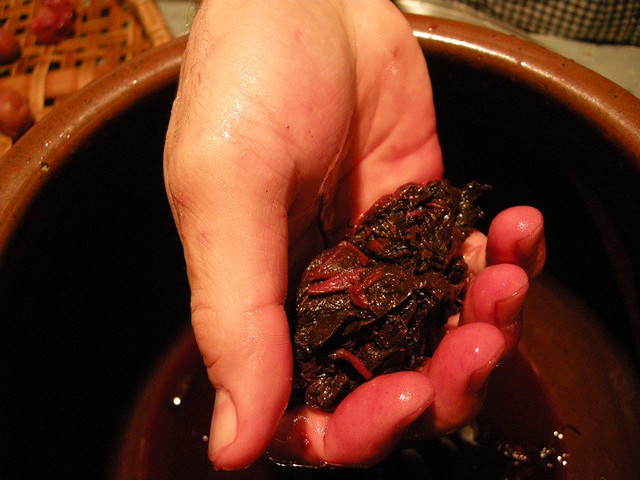 Aka-shiso
Aka-shiso
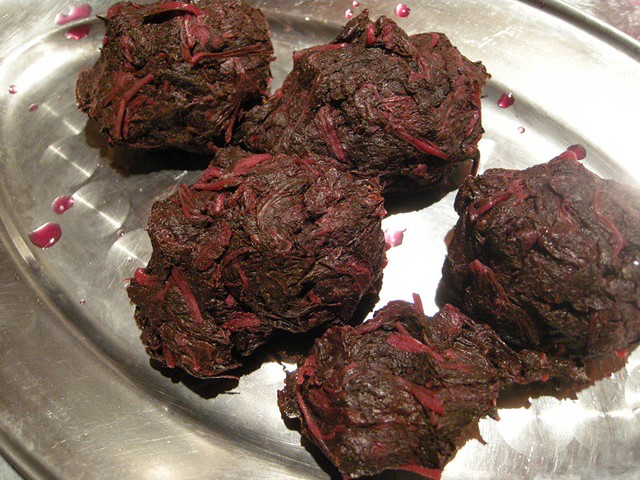 Aka-shiso, after extracting all liquid
Aka-shiso, after extracting all liquid
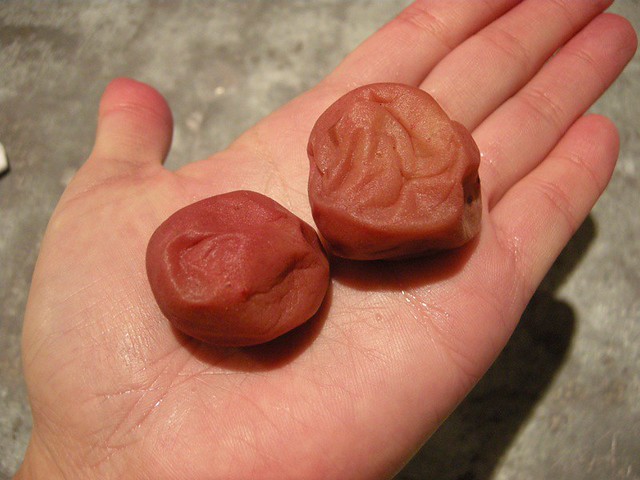
Our umeboshi!
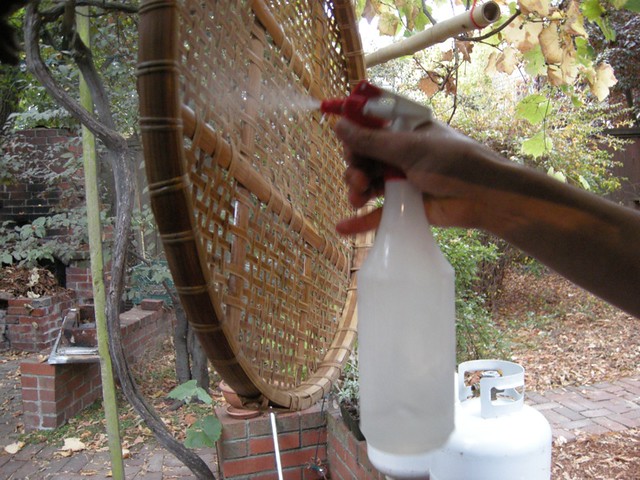 Sylvan spraying the bamboo drying rack with alcohol to disinfect
Sylvan spraying the bamboo drying rack with alcohol to disinfect
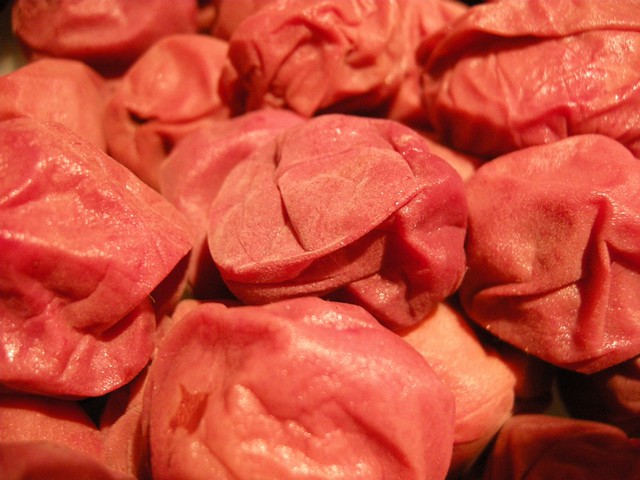 These ume did have a nice matte finish, as Yamahomo mentioned is ideal for umeboshi
These ume did have a nice matte finish, as Yamahomo mentioned is ideal for umeboshi
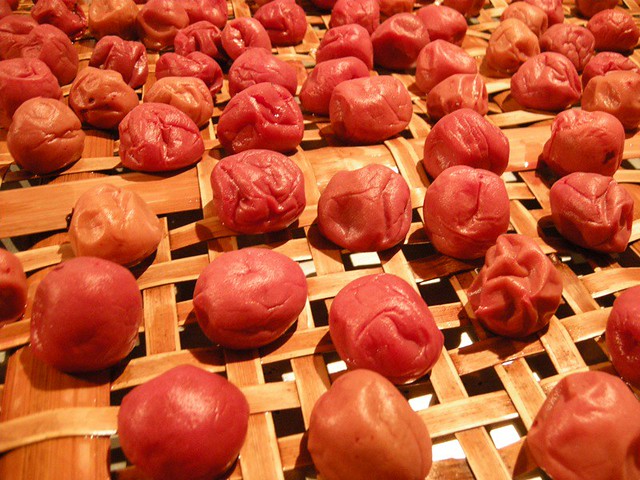 So cute!
So cute!
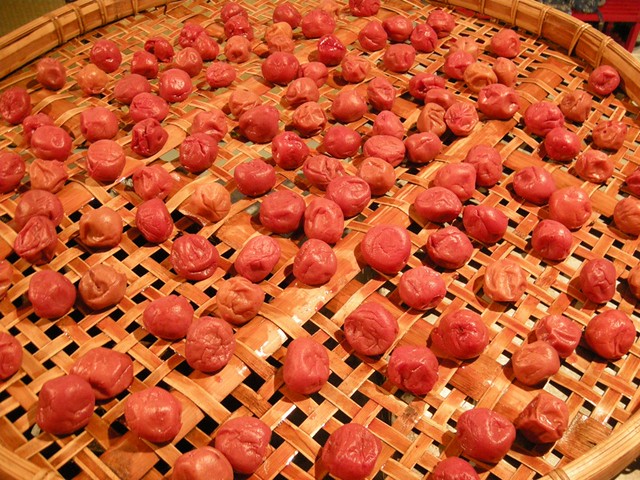 Lay all plums on the drying rack
Lay all plums on the drying rack
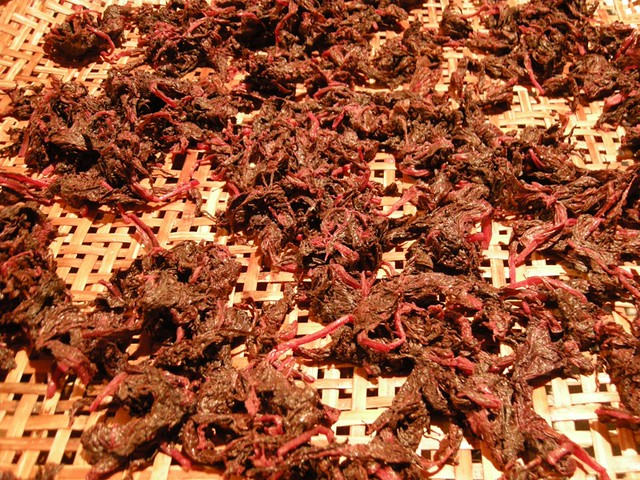 Aka-shiso will also be dried, then used as seasoning
Aka-shiso will also be dried, then used as seasoning
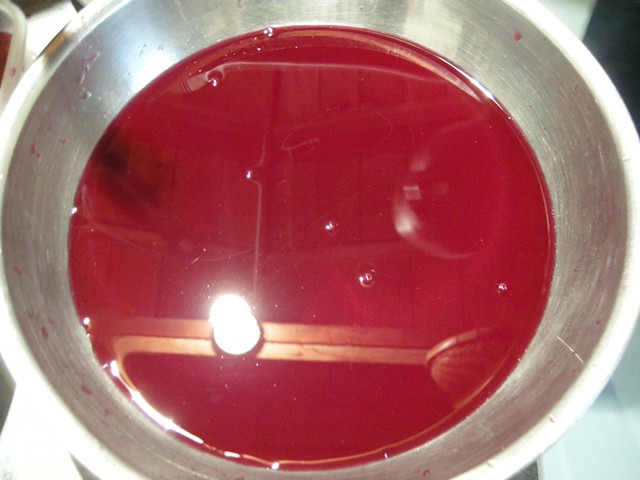 Don't you dare throw out the pickling liquid! This is ume-zu (ume-vinegar), which is like gold
Don't you dare throw out the pickling liquid! This is ume-zu (ume-vinegar), which is like gold
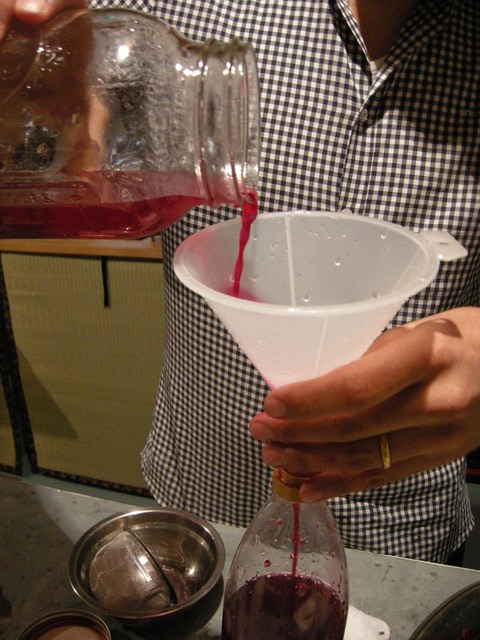 Bottle it up
Bottle it up
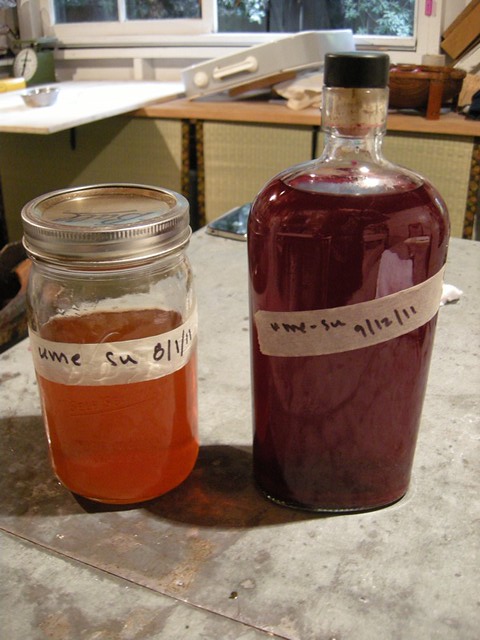 Look at the color difference, from the ume-zu before the addition of the aka-shiso. Crazy!
Look at the color difference, from the ume-zu before the addition of the aka-shiso. Crazy!
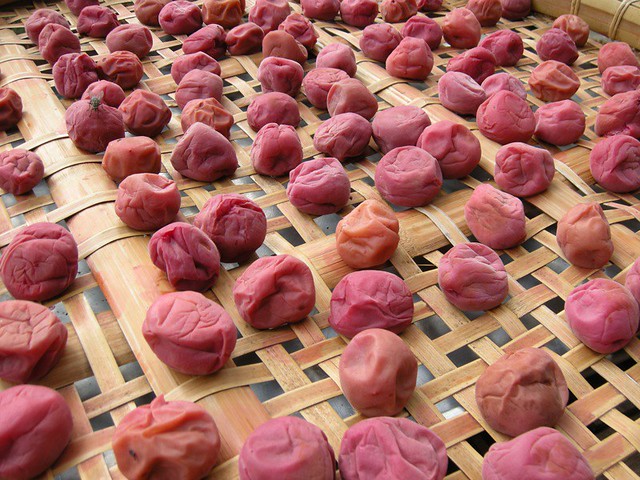 Let them dry in the California sun. Er, Oakland fog. Keep those flies away!
Let them dry in the California sun. Er, Oakland fog. Keep those flies away!
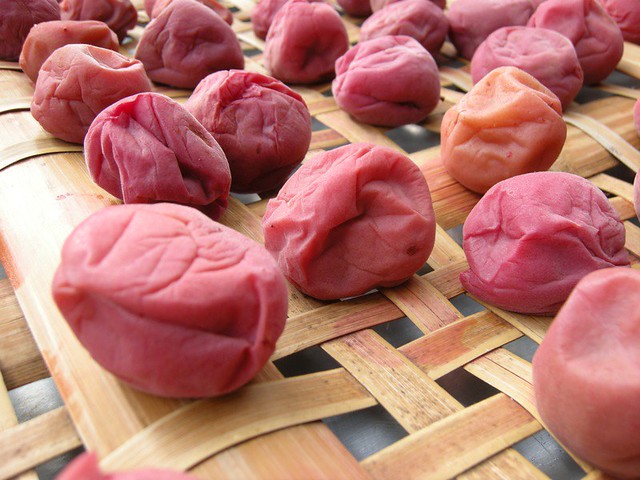 Thanks to all the aka-shiso we added last month, the pinks and peaches of the umeboshi are gorgeous!
Thanks to all the aka-shiso we added last month, the pinks and peaches of the umeboshi are gorgeous!
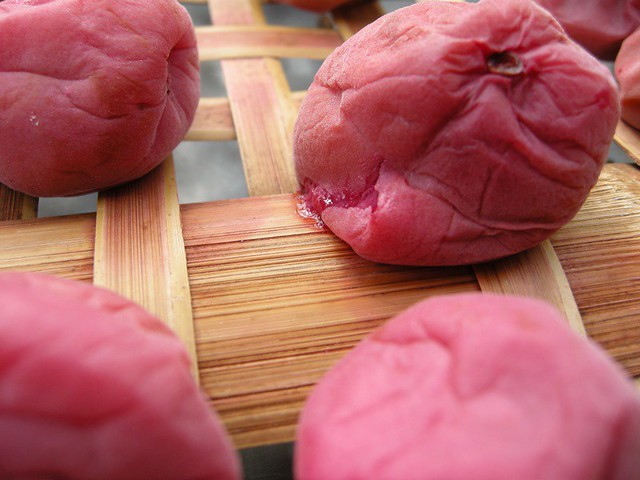 Umeboshi porn, oozing with ume goodness
Umeboshi porn, oozing with ume goodness
You are supposed to leave them out over night, and turn them over once. They say that you should dip them in the
ume-zu when turning, which we did not do.
Overall, our first attempt at making
umeboshi was not so shabby! Because we added
ume-shu (liqueur) to the pickling fluid, they are quite fragrant, and less intense than your run-of-the-mill
umeboshi--although they are still tart, they have a rounded quality to the taste.
In texture, they are plump and soft, and the color is quite dynamic, due to all the
aka-shiso we added. Hooray! Sylvan is making
shibazuke (a bright, purple pickle) with the
ume-zu now.
What would we do different next year? Sylvan mentioned that he would like to use
ume that is more ripe (as was Yamahomo's suggestion in the very beginning). He also would like to dip them in the
ume-zu when turning them at the end, as Sylvan thinks they would retain their shape better this way.
I personally would love to make those really sweet, giant, honey-coated
umeboshi, that are prized in Japan. Maybe Yamahomo is right, and we should just use apricots next year instead of "plums".
Thanks to Sylvan for letting us join you for this
umeboshi adventure. Looking forward to our 2012 batch!
 PREFACE
The Ume Project: Foraging
The Ume Project: Pickling for Umeboshi
The Ume Project: Umeshu (Plum Liqueur)
The Ume Project: The Aka-Shiso Edition
Since July, Yoko and I have been working on umeboshi (pickled plums) with Sylvan of Peko Peko, a Japanese catering company based in Oakland. From picking our own ume from a backyard Berkeley tree, to hunting down enough aka-shiso (red perilla leaves) to help add color to them during the pickling process, we did it all. And here are the fruits of our labor.
PREFACE
The Ume Project: Foraging
The Ume Project: Pickling for Umeboshi
The Ume Project: Umeshu (Plum Liqueur)
The Ume Project: The Aka-Shiso Edition
Since July, Yoko and I have been working on umeboshi (pickled plums) with Sylvan of Peko Peko, a Japanese catering company based in Oakland. From picking our own ume from a backyard Berkeley tree, to hunting down enough aka-shiso (red perilla leaves) to help add color to them during the pickling process, we did it all. And here are the fruits of our labor.
 The plump ume marinating with the aka-shiso and ume-zu (pickling fluid-->ume vinegar)
The plump ume marinating with the aka-shiso and ume-zu (pickling fluid-->ume vinegar)
 Aka-shiso
Aka-shiso
 Aka-shiso, after extracting all liquid
Aka-shiso, after extracting all liquid
 Our umeboshi!
Our umeboshi!
 Sylvan spraying the bamboo drying rack with alcohol to disinfect
Sylvan spraying the bamboo drying rack with alcohol to disinfect
 These ume did have a nice matte finish, as Yamahomo mentioned is ideal for umeboshi
These ume did have a nice matte finish, as Yamahomo mentioned is ideal for umeboshi
 So cute!
So cute!
 Lay all plums on the drying rack
Lay all plums on the drying rack
 Aka-shiso will also be dried, then used as seasoning
Aka-shiso will also be dried, then used as seasoning
 Don't you dare throw out the pickling liquid! This is ume-zu (ume-vinegar), which is like gold
Don't you dare throw out the pickling liquid! This is ume-zu (ume-vinegar), which is like gold
 Bottle it up
Bottle it up
 Look at the color difference, from the ume-zu before the addition of the aka-shiso. Crazy!
Look at the color difference, from the ume-zu before the addition of the aka-shiso. Crazy!
 Let them dry in the California sun. Er, Oakland fog. Keep those flies away!
Let them dry in the California sun. Er, Oakland fog. Keep those flies away!
 Thanks to all the aka-shiso we added last month, the pinks and peaches of the umeboshi are gorgeous!
Thanks to all the aka-shiso we added last month, the pinks and peaches of the umeboshi are gorgeous!
 Umeboshi porn, oozing with ume goodness
You are supposed to leave them out over night, and turn them over once. They say that you should dip them in the ume-zu when turning, which we did not do.
Overall, our first attempt at making umeboshi was not so shabby! Because we added ume-shu (liqueur) to the pickling fluid, they are quite fragrant, and less intense than your run-of-the-mill umeboshi--although they are still tart, they have a rounded quality to the taste.
In texture, they are plump and soft, and the color is quite dynamic, due to all the aka-shiso we added. Hooray! Sylvan is making shibazuke (a bright, purple pickle) with the ume-zu now.
What would we do different next year? Sylvan mentioned that he would like to use ume that is more ripe (as was Yamahomo's suggestion in the very beginning). He also would like to dip them in the ume-zu when turning them at the end, as Sylvan thinks they would retain their shape better this way.
I personally would love to make those really sweet, giant, honey-coated umeboshi, that are prized in Japan. Maybe Yamahomo is right, and we should just use apricots next year instead of "plums".
Thanks to Sylvan for letting us join you for this umeboshi adventure. Looking forward to our 2012 batch!
Umeboshi porn, oozing with ume goodness
You are supposed to leave them out over night, and turn them over once. They say that you should dip them in the ume-zu when turning, which we did not do.
Overall, our first attempt at making umeboshi was not so shabby! Because we added ume-shu (liqueur) to the pickling fluid, they are quite fragrant, and less intense than your run-of-the-mill umeboshi--although they are still tart, they have a rounded quality to the taste.
In texture, they are plump and soft, and the color is quite dynamic, due to all the aka-shiso we added. Hooray! Sylvan is making shibazuke (a bright, purple pickle) with the ume-zu now.
What would we do different next year? Sylvan mentioned that he would like to use ume that is more ripe (as was Yamahomo's suggestion in the very beginning). He also would like to dip them in the ume-zu when turning them at the end, as Sylvan thinks they would retain their shape better this way.
I personally would love to make those really sweet, giant, honey-coated umeboshi, that are prized in Japan. Maybe Yamahomo is right, and we should just use apricots next year instead of "plums".
Thanks to Sylvan for letting us join you for this umeboshi adventure. Looking forward to our 2012 batch!



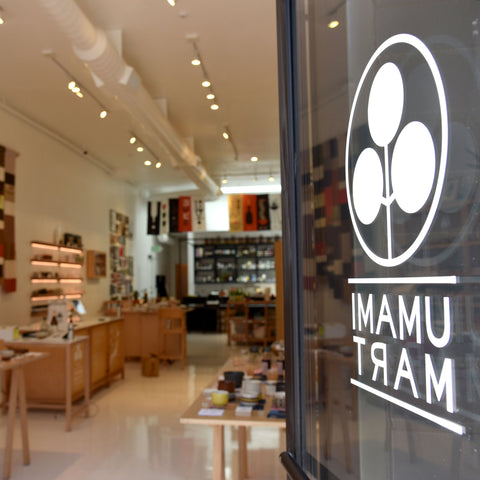
Comments (6)
Please ship some to Ritz Carlton, I will be there from Sunday.
Awesome job, girls!
Amazing! They look perfect. And I didn’t realise shibazuke was made with umezu (although I really should’ve known!)
Thank you for this great article and the photos. Really a lot of fun to see and read. Curious about your mention of doing it with apricots— does anyone do this, commercially?
There used to be a product sold, perhaps by The Grain and Salt society that went by the name umeboshi apricots. But the funny thing is, in Europe, they call them apricots, but they are the same that we call “plums” in the U.S..
My husband researched it on line, and found that the umeboshi is actually neither a true apricot nor a true plum botanically, but is related to both.
If you do try it with apricots, I’d love to hear about the results.
Such an interesting endeavor— umeboshi in Berkeley? Good luck with your future experimentation in this vein.
Nice. My batch got moldy :( Somehow, when my mother makes it, it looks easy. There doesn’t seem to be much sterilization at all.
Where’d you get your bamboo drying mats?